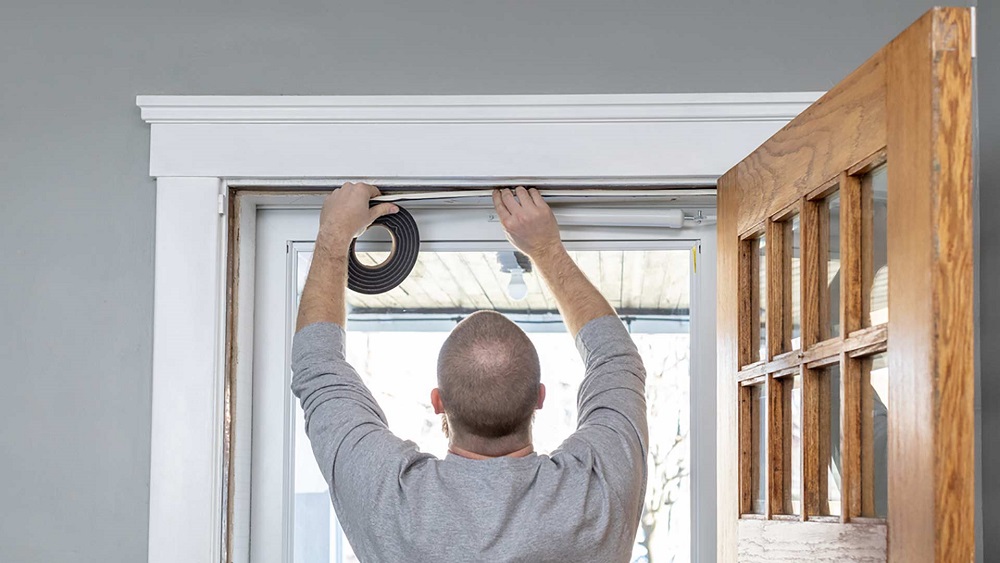Each winter, Mainers struggle to keep warm without spending a fortune. To help, we thought we’d share some of our best home heating tips.
One of the best uses of your weekend chore time is to spend it sealing up air leaks and drafts. Heat loss due to cracks and gaps in building materials (including your windows and doors) accounts for significant heat loss. That can add up to major energy expenses! Depending on the age of your house, quality of your windows and storms, and how much air loss is occurring in your home, you can save anywhere from 15 – 50% in heating costs by simply sealing leaks with weather stripping, insulation, and sound repairs. Wow, that heating tip can make a difference!

Having good insulation is one of the best ways to save money during the winter. Your top priority – insulating the attic or crawlspaces in your house. If you look at your roof after a snowfall and see melted spots, you don’t have enough insulation in that area. Heat loss through your roof and eves also sets you up for damaging ice dams during freeze-thaw cycles.
No matter how diligent you are about sealing up any air leaks in your home, windows and wood flooring will always be a cold spot when the temperatures dip particularly low. Properly using window treatments, as in closing your curtains and shades, go a long way to blocking out cold drafts and keeping heat inside. Add a layer of comfort to any room with an area rug covering that cold wood flooring.
Just as you should close your window blinds when it’s dark and cold out, opening them up when it’s a nice sunny day will warm up your house without turning the thermostat up. Even in the dead of winter, southern exposure on a sunny day can offer a decent amount of heat to your rooms.

The problem with turning your thermostat way down while you are away is that it takes that much more energy from your heating system to heat your house up to comfortable temperature once you are home. Dramatic shifts in temperatures make your heating system work harder, using extra energy, and burns any savings you may have gained. It’s much better to keep your home at a temperate 60 – 65 degrees all the time, so when you want to warm up to 70 degrees or so it’s not so much work for your furnace.
There’s nothing cozier than a flickering fireplace on a cold night. The problem is that traditional fireplaces draw oxygen from the house to feed the fire, including pulling all the heat your boiler has worked so hard to produce. If you must run a fireplace, install glass doors to run a more efficient fire. Be sure that you have a solid draft installed, and keep it closed tightly whenever the fireplace is not in use. Your chimney is sucking (heated) air out of the house and up all the time. Even a better bet – consider installing an efficient wood stove insert into your fireplace box for a more cost-effective heating source.
Exposed hot water pipes in your basement are losing two to five degrees for every 10 feet of pipe. There are lots of easy to install insulation options these days, making this a simple weekend project with a decent payoff. Insulate as much exposed pipe as you can access, paying close attention to pipes on exterior walls or particularly cold areas of your basement or unfinished spaces.
Large pieces of furniture, boxes, and other items blocking your heat registers isn’t doing your comfort level any good. They are also fire hazards. Make sure all your baseboards and heat registers are unobstructed so you can get the most out of the heat trying to radiate out. Also give them a good annual cleaning as dirt and debris will also obstruct the flow of valuable heat into a room.
Heat pumps are one of the most efficient heating system options on the market. Potentially saving you as much as 30% in heating costs, they are an excellent alternative to traditional heating systems. Heat pumps also provide air conditioning in warm months, making them an efficiency double benefit to household energy savings.
Most people only think about their heating system when it’s time to turn up the thermostat or order fuel. Heating equipment should be inspected and cleaned once a year to ensure it is in the best working condition and running at optimum efficiency. Homeowners can easily change the filters themselves, which should be done monthly during peak use. Ductwork shouldn’t be left out either. Inspect it regularly to make sure there are no gaps and leaks, wasting valuable heat.